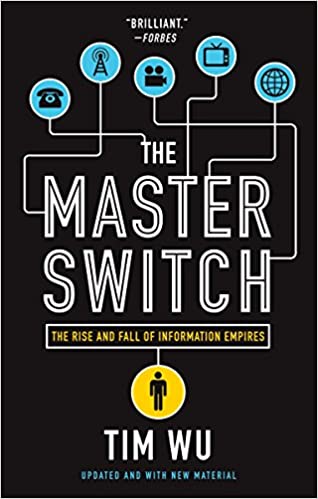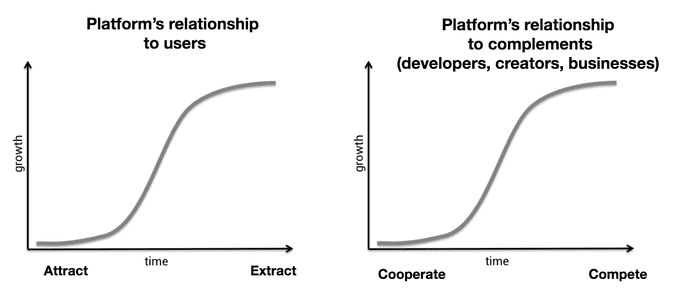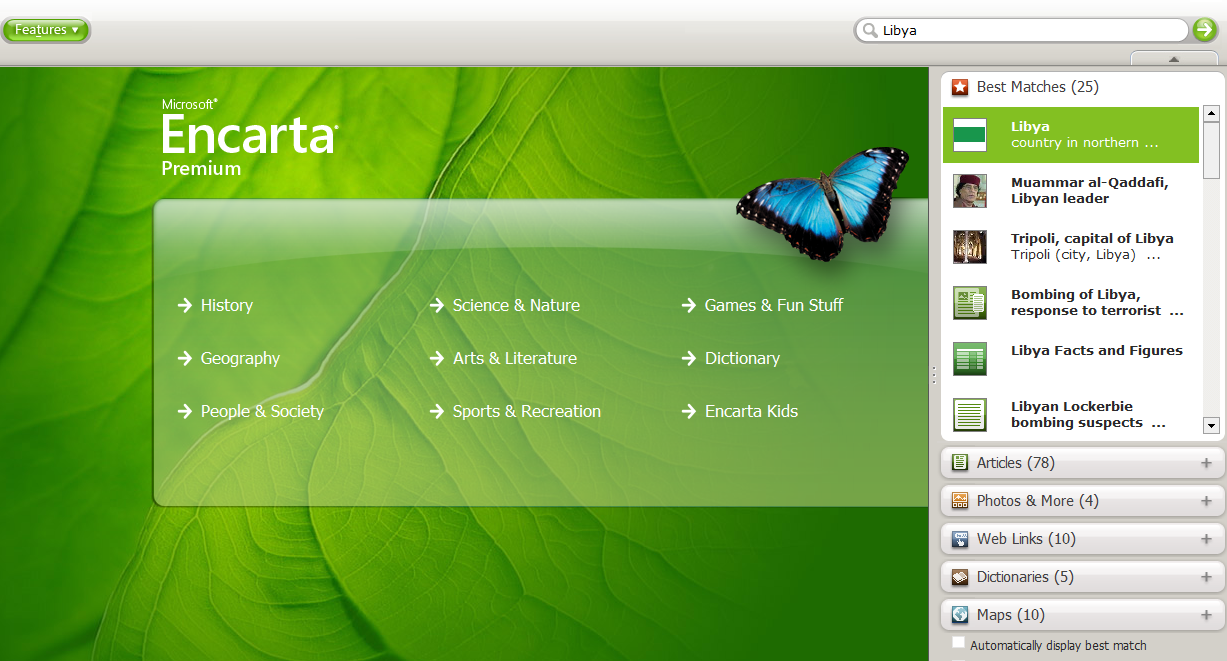
👩💻 The internet's third era
The internet's first era was open platforms. In the second era huge, more closed, companies were built on top of those platforms. Now when we enter the third era, we can again create a more open internet.
Share this story!
“The entire Earth will be converted into a huge brain, as it were, capable of response in every part of it.”
Is this a description of the internet? No.
Personal computers? No.
Mobile phones? No.
Television? No.
Radio? Yes.
It was Nikola Tesla who said this about radio in 1904. But it could have been, and has been, said of all the others also. With every new information or communication technology people have expressed a hope that this will open up information, and thereby the world.
They have been both right and wrong. The new technologies have made the world more open, information, and knowledge more widespread. But after a while it has often ended up being controlled by a few actors.
In the U.S., radio came under the control of CBS and NBC. In Sweden we made sure no one except the government was allowed to broadcast radio through a monopoly for many decades.
The Cycle
Tim Wu calls this the Cycle. He is a professor at Columbia University and author of the book The Master Switch - The Rise and Fall of Information Empires.

The Cycle is the cycle (duh) that information technologies goes through:
“History shows a typical progression of information technologies: from somebody’s hobby to somebody’s industry; from jury-rigged contraption to slick production marvel; from a freely accessible channel to one strictly controlled by a single corporation or cartel—from open to closed system.”
Every time people have said: This time it’s different.
This has been said about the internet as well. And again, we have been both right and wrong. Right because this new technology made society more open and gave new actors a voice they didn’t have before. But wrong because eventually much of it has ended up in the control of a few information empires.
Tim Wu wrote the book in 2010, and if we look at the internet in the last ten years, this is precisely what has happened. A few actors– Google, Apple, Facebook and Amazon (GAFA) – play a larger and larger role.
It might sound like this is all bad, but it’s not. The services GAFA provides have made it possible for small players to challenge big ones. Like all the phenomenal podcasters and YouTubers, made possible thanks to Apple and Google.

In the second era you play by GAFA's rules
But at the same time, you have to play by GAFA’s rules. And those rules can change overnight without any transparency and you can do absolutely nothing about it. We are in what Chris Dixon calls the second era of the internet.
“During the first era of the internet — from the 1980s through the early 2000s — internet services were built on open protocols that were controlled by the internet community.”
“During the second era of the internet, from the mid 2000s to the present, for-profit tech companies — most notably Google, Apple, Facebook, and Amazon (GAFA) — built software and services that rapidly outpaced the capabilities of open protocols.”
These centralized platforms are very effective, rich and make great products but they go through a predictable life cycle.
First they are eager to get new users and need help from 3rd-parties like developers, media and other businesses. As they grow their power over users and 3rd parties also increases and they frankly don’t care as much for their needs.

“When they hit the top of the S-curve, their relationships with network participants change from positive-sum to zero-sum. The easiest way to continue growing lies in extracting data from users and competing with complements over audiences and profits.”
Facebook might be the best, or at least the most well-known recent example. Do you remember that you could play games like FarmVille on Facebook like ten years ago? Zynga built a big business out of that. But not anymore. And Facebook’s use of data is well-known. (Again, this is not all bad. That data helps us at Warp Institute to find optimists all over the world, for example.)
But when this happens the product stagnates, and that of course opens up for competition.
Tim Wu again:
“History also shows that whatever has been closed too long is ripe for ingenuity’s assault: in time a closed industry can be opened anew, giving way to all sorts of technical possibilities and expressive uses for the medium before the effort to close the system likewise begins again.”
The internet’s third era
Effectiveness, focus and financial muscle made it possible for GAFA and others to build huge companies on top of the open platforms created during the first era. The best developers either worked for them or for 3rd parties that enabled their growth.
But no matter how big they become, they could never hire enough people to compete with an attractive open platform.
David vs. Goliath
Microsoft vs. Wikipedia is a perfect example.

Encarta was Microsoft’s encyclopedia that they spent considerable money on in the 1990s and early 2000s. The giant tech company versus a few enthusiasts without any money. Doesn’t sound like a fair fight. And it wasn’t. Wikipedia blew Microsoft out of the water. From the start Encarta was a much better product, but Wikipedia improved faster thanks to a large network of volunteer contributors. Encarta was shut down in 2009.
Wikipedia’s success was that they won hearts and minds - the brainpower of thousands of people - and that is even stronger than financial muscle.
Achieving what Wikipedia did on such a large scale, without economic incentives, is not easy. But what if we can take the best of Wikipedia, and add money?
In the last ten years, that is what has begun to happen. It started with Bitcoin and has developed into the token economy or crypto networks. The basic idea is that you get a financial reward for the value you add to the network.
Most brains win
Working in an open platform is often more attractive because it gives you more say in how the platforms evolve, and changes are addressed well in advance so you can adapt. If you can run a business in such an environment, many prefer to say the App Store, where changes more or less just happen.
The battle is over the brains. The one with the most number of brains connected wins.
“Centralized systems often start out fully baked, but only get better at the rate at which employees at the sponsoring company improve them. Decentralized systems start out half-baked but, under the right conditions, grow exponentially as they attract new contributors.”
This is why you often need economic incentives, to get the brains to stay long enough. Then an open platform has a chance to create a much better product, in an environment that is better to build in.
The outcome for the third era of the internet is not predetermined. GAFA has vast resources and large user bases. But crypto networks have a much more attractive value proposition to developers.
If this means that the Cycle has been broken, or will repeat itself, I don’t know. But every cycle has brought us forward. Made it possible for more people to make their voices heard. And that in itself is good progress.
For some reason, I now want to play Mass Effect all weekend.
By becoming a premium supporter, you help in the creation and sharing of fact-based optimistic news all over the world.


